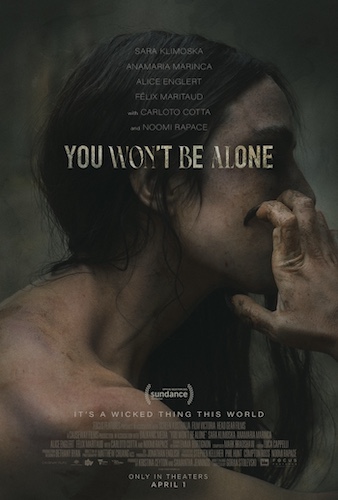Talking Pictures: You Won’t Be Alone
5 Minutes Read Time

Assistant Editor Holli Carrell: “This isn’t working,” my screenwriting professor says, tapping his pen against my pages. “There’s too much voiceover, not enough action.” I am nineteen, a film student in the years before streaming, and I want to be a screenwriter. My professor is kind—the script is awful for various reasons, but the most glaring offense is my overuse of voiceover. My protagonist’s reflective offscreen narration overexplains each scene, inhibiting the film’s action. I have yet to realize that an audience needs to see the events of a character’s life, not just be told them.
Translating a character’s feelings and motivations visually through only image, action, and dialogue is one of the significant challenges of screenwriting; at least, it was for me. That could be why, fifteen years later, I write poems, not films: my love of the lyric tugged me in another direction. Still, I’m always interested when a film (especially a drama) can not only pull off a voiceover but implement it so skillfully within its construction that it feels elemental to the story and a character’s journey. You Won’t Be Alone, Goran Stolevski’s 2022 Macedonian-language debut, is one of those films for me.
You Won’t Be Alone is a gruesome, gorgeous, enigmatic film: a witch’s bildungsroman with a sprinkling of body horror, set in a remote nineteeth-century Macedonian village. The film begins with a shapeshifting and disfigured witch named Maria (Anamaria Marinca) attempting to snatch a villager’s baby girl for a fast and nutritious meal. The horrified mother makes a blood bargain with the witch: if Maria spares the infant’s life, she can have the girl when she turns sixteen. Maria agrees but nabs the infant’s tongue as long-term insurance.
Everyone knows you can’t outwit a witch, but the mother, nevertheless, tries. The infant, Nevena, is brought to a holy cave where she lives and grows into a young woman (Sara Klimoska)— sheltered, isolated, and without speech—knowing no other environment or human contact but that which her mother occasionally provides. Nevena’s destiny is ultimately unthwartable, and Maria reappears after sixteen years. But instead of killing Nevena, Maria slays her mother, then draws Nevena into the outside world, transforming her into a witch, too.
Nevena’s astonished attention to the vibrant, multifaceted world she never knew existed is incredibly moving, to say the least. The cinematography lingers over lush natural imagery, shifting both in and out of Nevena’s perspective in a style reminiscent of Terrance Malick. Stolevski uses voiceovers from time-to-time to pull us inside Nevena’s thinking: a directorial choice that feels important for Nevena’s characterization because she cannot speak or engage in dialogue. Nevena’s inner speech is deliciously strange, fragmented, and highly associative—a poem probing selfhood that slips to the surface amid the film’s propulsive action:
But are sparrows snakes?
Are women wasps?
Kisses chains?
Me, am I devils?
Because she’s only met two humans in her life, much of Nevena’s narration centers on trying to make sense of herself as a witch and woman based on the only two models she knows: her biological mother and Maria, both diametrically opposite. Unlike Nevena’s sheltering mother, Maria is violent, cruel, unsympathetic, and blood-hungry. Maria’s brutality comes from an intimate knowledge of the cruelty of humanity that Nevena does not yet possess. Maria scorns Nevena’s desire to connect with animals and humans, and the witch-mentorship quickly fails. Maria abandons Nevena (for now) to navigate the world and humankind on her own terms.
In previous interviews, Stolevski has noted Virginia Woolf’s influence on the film. Woolf’s signature modernist style is felt not only in Nevena’s stream-of-consciousness narration and the film’s delicate dance between interior and exterior states but also in Nevena’s Orlando-esque body shifting. At a turning point in the film, Nevena realizes she can assume the forms of animals and humans through a not-so-pretty process of gut transference. She abandons her original form for the remainder of the film, evolving into a woman, dog, man, and child. In lesser films, this body-swapping might be chaotic and disorienting, drawing an audience away from a protagonist and their journey at critical junctures. However, this is not the case in Stolevski’s hands: Nevena’s voice and narration remain consistent throughout each change, brilliantly tethering us to her distinct inner voice and growth throughout each shift in body and actor.
In fact, Stolevski suggests that Nevena’s body shifting is what allows her to gain wisdom and self-actualization. Nevena’s intimate understanding of the full spectrum of human experience— both the beautiful and brutal moments that different bodies, sexes, and genders endure—allows her to develop a more profound compassion for others and love. You Won’t Be Alone is a breathtaking and nuanced film that not only skillfully employs lyric voiceovers to illuminate a character’s inner voice and perceptions, but it is also a work of art that asks us to interrogate our individual and shared capacity for transformation, healing, and growth.
In the film Adaptation, there’s a famous scene where the character based on Robert McKee warns his screenwriting students that using voiceover in their films is a hallmark of “flaccid, sloppy writing.” God help you if you use voiceover, my friends. God help you, Robert says. Looking back at my nineteen-year-old self, sitting at my first workshop table and desperate for approval, I see a young writer who translated their teacher’s warning to not rely too heavily on offscreen narration as an absolute rule that all voiceovers were unacceptable, bad. Perhaps much of our development as writers is learning to cross-examine the craft conventions we once believed were hard-and-fast rules, allowing ourselves the space to grow beyond these self-imposed limits and boundaries. Who knows, maybe it’s time for me to pull out those old scripts for a round of revisions.
What writing conventions are you trying to shake off?
